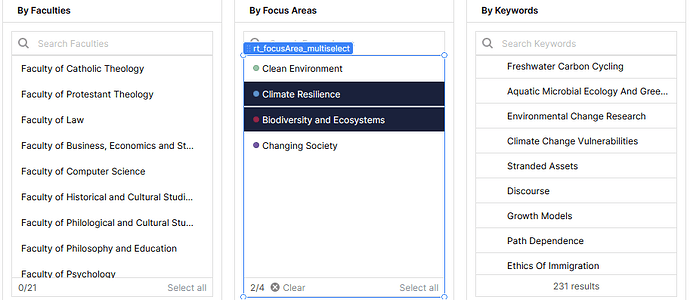Hello!
I have an issue with my query:
So I have a database where we collect our members, we also have a table called focus areas which has an n:m relation to our experts(members) table.
additionally I also have a department table which is connected to a faculty table as well as a keyword table connected to experts via the expertise table.
I have filtered the query by selecting the faculties and the keywords, that is when I select them the query only returns the members with the respective keyowrds or and faculties. I want to do the same for focusarea. The issue Im encountering is the following: I have only 4 focus areas, when I filter for the first just one it works fine, but whenever I select more than one, it filters by only the smallest id number.
what I want is to display all experts that have at least one of the selected focus areas but also show all the focus areas they have.
Here are the table/multiselects by which I want to filter:
each of the items has an id.
here is my query:
SELECT
e.*,
d.name AS department_name,
d.department_id AS department_id,
f.name AS faculty_name,
COALESCE(GROUP_CONCAT(DISTINCT k.name SEPARATOR ', '), '') AS keywords,
COALESCE(GROUP_CONCAT(DISTINCT fo.focus ORDER BY fo.focus SEPARATOR ', '), '') AS focus_id,
COALESCE(GROUP_CONCAT(DISTINCT fa.name ORDER BY fa.name SEPARATOR ', '), '') AS focus_name,
COALESCE(GROUP_CONCAT(DISTINCT fa.color ORDER BY fa.color SEPARATOR ', '), '') AS focus_color
FROM Expert e
JOIN Department d ON e.department = d.department_id
JOIN Faculty f ON d.faculty = f.faculty_id
LEFT JOIN Expertise ex ON e.expert_id = ex.expert
LEFT JOIN Keyword k ON ex.keyword = k.keyword_id
LEFT JOIN Focus fo ON e.expert_id = fo.expert
LEFT JOIN FocusAreas fa ON fo.focus = fa.focus_id
WHERE f.faculty_id IN (
{{
rt_faculty_multiselect.value.length == 0
? rt_faculty_multiselect.values.map(x => parseInt(x))
: rt_faculty_multiselect.value.map(x => parseInt(x))
}}
)
GROUP BY e.expert_id
HAVING (
{{ rt_focusArea_multiselect.value.length === 0 }}
OR (
COUNT(CASE
WHEN fo.focus IN (
{{
rt_focusArea_multiselect.value.map(x => parseInt(x)).join(',')
}}
)
THEN 1 ELSE NULL
END) > 0
)
)
AND (
{{ rt_keywords_table.selectedRows.length > 0 }}
AND (
COUNT(CASE
WHEN k.keyword_id IN (
{{
rt_keywords_table.selectedRows.map(x => parseInt(x.keyword_id)).join(',')
}}
)
THEN 1 ELSE NULL
END) > 0
OR COUNT(k.keyword_id) = 0
)
OR {{ rt_keywords_table.selectedRows.length == 0 }}
)
ORDER BY e.last_name;
I have also teid to use IN as follows:
SELECT
e.*,
d.name AS department_name,
d.department_id AS department_id,
f.name AS faculty_name,
COALESCE(GROUP_CONCAT(k.name SEPARATOR ', '), '') AS keywords,
COALESCE(GROUP_CONCAT(fo.focus SEPARATOR ', '), '') AS focus_id,
COALESCE(GROUP_CONCAT(fa.name SEPARATOR ', '), '') AS focus_name
FROM Expert e
JOIN Department d ON e.department = d.department_id
JOIN Faculty f ON d.faculty = f.faculty_id
LEFT JOIN Expertise ex ON e.expert_id = ex.expert
LEFT JOIN Keyword k ON ex.keyword = k.keyword_id
LEFT JOIN Focus fo ON e.expert_id = fo.expert
LEFT JOIN FocusAreas fa ON fo.focus = fa.focus_id
WHERE f.faculty_id IN (
{{
rt_faculty_multiselect.value.length == 0
? rt_faculty_multiselect.values.map(x => parseInt(x))
: rt_faculty_multiselect.value.map(x => parseInt(x))
}}
) AND fo.focus IN (
{{
rt_focusArea_multiselect.value.length == 0
? rt_focusArea_multiselect.values.map(x => parseInt(x))
: rt_focusArea_multiselect.value.map(x => parseInt(x))
}}
)
GROUP BY e.expert_id
HAVING (
{{ rt_keywords_table.selectedRows.length > 0 }}
AND (
COUNT(CASE WHEN k.keyword_id IN (
{{
rt_keywords_table.selectedRows.length > 0
? rt_keywords_table.selectedRows.map(x => parseInt(x.keyword_id))
: [-1]
}}
) THEN 1 ELSE NULL END) > 0
OR COUNT(k.keyword_id) = 0
)
)
OR {{ rt_keywords_table.selectedRows.length == 0 }}
ORDER BY e.last_name
but this then only shows me the focus areas I have selected and not all the focus areas the member has.
I am not sure if this is retool specific or sql in general but I figured I am going to ask here anyway.
as an example, I have selected focus areas with ids 2 and 3 but the result is the following when I console.log:
-
expert_id: Array(20)
-
first_name: Array(20)
-
last_name: Array(20)
-
title_pre: Array(20)
-
title_post: Array(20)
-
gender: Array(20)
-
membership_since: Array(20)
-
membership_until: Array(20)
-
career_level: Array(20)
-
mail: Array(20)
-
phone: Array(20)
-
website: Array(20)
-
profile_image: Array(20)
-
orcid: Array(20)
-
ucris: Array(20)
-
google_scholar: Array(20)
-
files: Array(20)
-
department: Array(20)
-
department_name: Array(20)
-
department_id: Array(20)
-
faculty_name: Array(20)
-
keywords: Array(20)
focus_id: Array(20)
-
0: "2, 3"
-
1: "2, 4"
-
2: "2, 3"
-
3: "2"
-
4: "1, 2"
-
5: "2"
-
6: "2"
-
7: "2"
-
8: "2, 4"
-
9: "2, 4"
-
10: "2, 4"
-
11: "2, 4"
-
12: "2, 4"
-
13: "2"
-
14: "2, 4"
-
15: "2"
-
16: "2"
-
17: "2, 3"
-
18: "2"
-
- 19: "2"
-
focus_name: Array(20)
it doesnt show members who only have focus area 3 (or in general members that dont have focus area 2).
Thank you for your help in advance!
